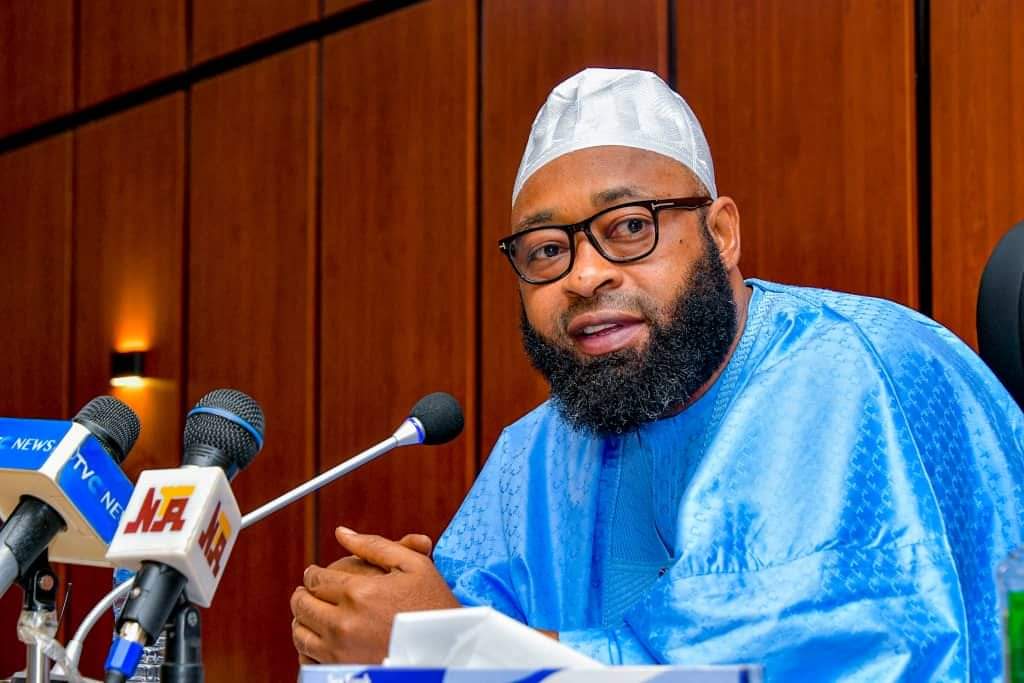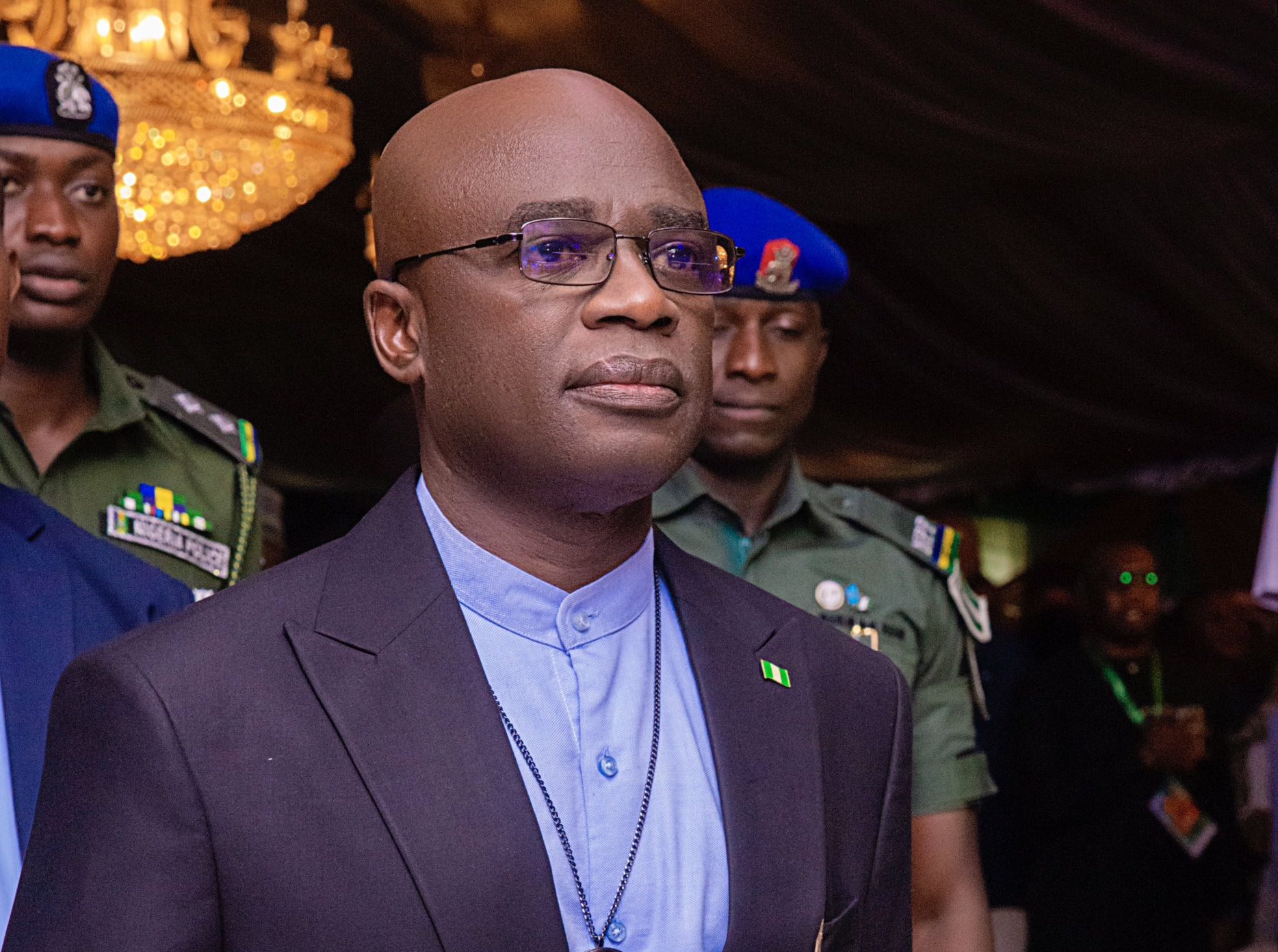Economy
Nigerian Govt. Hails CBN, NDIC, NAICOM, Others on Financial System Stability

President Muhammadu Buhari on Tuesday commended the Central Bank of Nigeria (CBN), alongside the Nigeria Deposit Insurance Corporation (NDIC), the National Insurance Commission (NAICOM) and the Securities and Exchange Commission (SEC), including other critical stakeholders for the apex bank’s diligent work aimed at ensuring financial system stability over the years.
Buhari, further assured that his administration would continue to support the entire banking and finance industry in all appropriate ways to ensure it continues to deliver on mandates while creating value innovation for customers.
The president gave the commendation at the opening of the 15th Annual Banking and Finance Conference with the theme: “Repositioning the Financial Services Industry for an Evolving Glocal Context,” held in Abuja.
Buhari, also said the government was committed to securing lives and property within the country and would not relent in ensuring a safe and secure environment for citizens as well as productive activities to thrive, noting that the menace of terrorism and banditry had been plaguing the country over the years.
He said, “Indeed, the fight to rid our country of banditry, kidnapping, and insurgency is being intensified at all fronts.”
Also, on the rising inflation, which had continued to cause increasing hardship for Nigerians, the president assured that his administration had over the years implemented several policies to combat inflation including an increase in Monetary Policy Rates (MPR) as well as a 30 per cent markup on savings rates.
He said these policies were geared towards mopping up excessive liquidity in the economy while encouraging savings and investment, stressing that government would continue to cushion these adverse effects through its social safety net programmes.
However, he said the government would continue to formulate and implement policies that are aimed at promoting self-sustenance in critical areas including energy, agriculture, health, and technologies, adding that the outputs of the conference would be valuable in shaping relevant policy initiatives.
Buhari, who was represented at the ceremony by the Minister of Finance, Budget and National Planning, Mrs. Zainab Ahmed, pointed out that the annual conference of the CIBN, among other things, provides a credible annual platform for a holistic review and evaluation of the performance of the sector by industry practitioners and regulators while charting the path for the future.
This, he said, explains why his administration had always ensured that government participation at the conference is at the highest possible level.
Buhari also expressed the need for a Nigeria of the future that harnesses her strengths, competences, and cultural diversity to confront current challenges plaguing the people, ranging from climate change to pandemics and insecurity.
Buhari, specifically noted that the theme of the conference was particularly relevant considering the need to constantly adapt internationally acceptable best practices to improve the efficiency and effectiveness of the sector in playing its primary role of holding financial assets, financial intermediation and capital formation.
He said the expediency of discussions on repositioning the sector within an evolving global context cannot be over-emphasised as it stands to benefit from the experiences of other nations in navigating through emerging issues such as the fall-out from the COVID-19 pandemic and the ongoing Russian-Ukraine war which have global implications on financial service delivery in local economies.
He said under the new regime, the role and significance of the finance industry cannot be overstated in driving economic prosperity by providing opportunities to create SME start-ups, expand existing business interests and create more jobs thereby pushing the local brand overseas to frontier markets.
The president added that repositioning the finance services industry involved valuable innovations to ensure global solutions reach local indigenous customers.
He said the recently executed African Continental Free Trade Agreement (AfCFTA) represented a typical reference point as the deal creates a continent-wide market embracing 55 countries with 1.3 billion people and a combined GDP of $3.4 trillion.
Buhari said the first phase of the regional trade agreement, which took effect in January 2021, would gradually eliminate tariffs on 90 per cent of goods and reduce barriers to trade in services.
He pointed out that the finance sector would serve not just as an intermediary for lenders and borrowers but in creating a new ecosystem consisting of platforms where ordinary Africans can buy and sell their locally made products despite currency disparity as being practiced on the Pan-African Payment and Settlement System (PAPSS), a brainchild of Afrexim Bank.
Buhari, among other things, noted that over the past seven years, his administration had through various initiatives supported the repositioning of the Nigerian economy within an evolving ‘glocal’ context.
He further listed the intervention measures to include support of Nigeria’s creative industry and indigenous Small and Medium-sized businesses as well as the agricultural sector which have enhanced the capacity of indigenous enterprises to compete with their counterparts from other countries., adding that these efforts would be sustained and extended to more sectors of the economy.
He said the resolution of global issues within the local context would continue to give impetus for economic prosperity in local communities, adding that climate change, eroding purchasing power due to inflation and insecurity are currently being tackled at both local and global levels.
However, in his remarks, the President of CIBN, Mr. Ken Opara, said the banking industry was not oblivious of the “brain drain or Japa syndrome” currently affecting the country’s workforce.
As a result, he said the development had necessitated research finding on the topic “The Analysis of Human Capital Attrition in an Evolving ‘GLOCAL’ Context: A Case Study of the Nigerian Banking Industry,” adding that the CIBN would present the outcome of research work during the conference.
Opara said the COVID-19 pandemic had been a wake-up call for the financial services industry, exposing gaps in digital service provision and cost structures.
He said, “COVID-19 proved a powerful catalyst for change. Banking’s digital transformation accelerated beyond everyone’s imagination, as radically new ways of working remotely and serving customers facing dire circumstances were launched at a fast pace. Mobile app transaction processing rocketed.
“Cash and cheque usage dropped dramatically, replaced by high volumes of electronic and card payments. Business lending to keep the economy afloat was off the scale.”
He said as the world continues to evolve, the financial services industry would need to explore innovation and reconfigure its business and operating platforms – in some cases requiring making profound changes to succeed in the future.
However, in his keynote address, the Chairman, Union Bank of Nigeria Plc, Mr. Farouk Gumel, said the banking industry must help support the kind of growth that leads to inclusivity, and accused financial system operators of embracing banking innovation at the detriment of rural communities.
He criticised ongoing conversations by some banks on the need to achieve operational efficiency by shutting down branches.
Gumel argued that rather than close branches, the best approach was to embrace the idea of re-branching.
He told THISDAY that banks don’t really require a big structure but rural branches targeted at the rural communities to drive financial inclusion.
He said, “You have to be next to somebody to convince him to trust you and I think that is how the banking system should look at it.
“Efficiency counts but you have to be inefficient if you are dealing with people in the rural areas.”
He said there has been a disproportionate level of progress in the banking sector without consideration for the rural population who are often neglected.
Specifically, he called for increased credit support for under-served Nigerians to enable them actualise their entrepreneurship aspirations.
Gumel, among other things, also said banking technology should not entirely take the place of human resources in the current model.
Economy
Bago inaugurates empowerment programme for 716 youths in Niger

Gov. Umaru Bago of Niger State has inaugurated an empowerment programme for 716 youths sponsored by a state lawmaker, Alhaji Sani Umar (APC-Kontagora 1), in Kontagora Local Government Area of the state.
While inaugurating the programme that involved disbursement of funds on Sunday in Kontagora, he said it would enable youths to acquire skills for self-reliance.
Bago, represented by his deputy, Mr Yakubu Garba, commended the lawmaker for the empowerment programme, which he described as people-centred.
He urged the beneficiaries to make good use of the support given to them, saying that the programme was designed to have a positive impact on their lives.
He said that the state government would continue to come up with policies th positive impact on the lives of the people, especially women and youths.
Bago said that youth empowerment was crucial to fighting unemployment, restiveness and hardship.
He commended the state legislators for their support and collaboration, attributing the government’s successes to their continued assistance and foresight.
The governor reiterated his resolve to foster cohesion between the executive and legislature, ensuring the delivery of democracy dividends to the electorate.
In his remarks, Alhaji Abdulmalik Sarkindaji, Speaker of the House of Assembly, commended the lawmaker for the initiative aimed at empowering the youths to become self-reliant.
He lauded the governor for not interfering with legislative engagements, and for promoting democratic principles in governance and the polity.
Earlier in his address, Umar, the sponsor of the programme, said the empowerment was aimed at reducing unemployment and restiveness among youths in his constituency.
He thanked the governor for his support and encouragement for the programme.
Also speaking, Alhaji Aminu Bobi, Chairman of the All Progressives Congress (APC) in Niger, thanked the governor for his support and administrative prowess, which he said had brought significant changes to the state.
One of the beneficiaries, Aisha Mohammed, thanked the lawmaker for the gesture and promised to make judicious use of the funds to better her life.
The News Agency of Nigeria (NAN) reports that the event was attended by top government officials, traditional rulers, and other stakeholders in the stat
Economy
Benue at 49: Governor Alia’s Vision for Economic Prosperity and Infrastructure Growth

As Benue State celebrates its 49th anniversary, Governor Hyacinth Alia has emphasized his commitment to driving the state to unprecedented levels of economic prosperity and infrastructural development.
In a statement signed by his Chief Press Secretary, Mr. Tersoo Kula, and made available to newsmen on Monday in Makurdi, Alia outlined the significant reforms his administration has set in motion since he assumed office.
“Less than two years into our administration, we have achieved remarkable breakthroughs, unprecedented in the history of the state,” said Alia.
The governor highlighted key achievements, including the rollout of programs aimed at boosting agricultural productivity and agribusiness to ensure food security and improve livelihoods. “We have rehabilitated roads, opened new ones, constructed and fixed public facilities to make Benue more accessible, enhancing economic growth,” he stated.
Alia also underscored the administration’s focus on healthcare, pledging to advance healthcare facilities to ensure quality and accessible services for all citizens. “Our resolve is to take the state where every citizen experiences prosperity, security, and opportunity,” he added.
The governor stressed that achieving these goals requires the collective efforts of all Benue citizens. “This target cannot be achieved alone. It calls for the collaborative determination of all stakeholders, community leaders, traditional rulers, business owners, and our energetic youth. Together, the administration can build a future that mirrors our joint desires,” Alia urged.
As the state marks its 49th anniversary, the governor called on the people to remain steadfast in their commitment to promoting Benue’s growth. “I extend a hand of fellowship to all stakeholders to join hands with us in this noble endeavour,” he concluded.
Economy
NCS Records Historic ₦6.1 Trillion Revenue in 2024

The Nigeria Customs Service (NCS) has achieved a historic milestone, collecting a record ₦6.1 trillion in revenue in 2024, surpassing its ₦5.1 trillion target by ₦1.03 trillion. This represents a 20.2% increase above the target and an impressive 90.4% rise from the ₦3.2 trillion collected in 2023.
Speaking at a press briefing in Abuja on January 14, 2025, the Comptroller-General of Customs, Bashir Adewale Adeniyi, attributed the remarkable performance to strategic reforms, enhanced operational efficiency, and strong alignment with government policy objectives. “This growth is historic as it marks the highest year-on-year increase recorded by the Service in recent times,” he noted.
The record-breaking revenue is segmented into ₦3.66 trillion for the Federation Account, ₦816.9 billion for Non-Federation Account Levies, and ₦1.63 trillion in Value Added Tax (VAT) on imports.
Adeniyi highlighted the Service’s effort to balance revenue collection with trade facilitation, granting concessions worth ₦1.68 trillion to stimulate industrial growth while tightening controls to prevent abuses.
The Service also achieved remarkable progress in trade facilitation, recording a 179.3% increase in total trade value to ₦196.94 trillion in 2024, compared to ₦70.5 trillion in 2023. This growth was driven by a surge in the export trade, which saw a 219.5% increase in value to ₦136.65 trillion.
Significant advancements were made in customs operations, including the introduction of the Advanced Ruling System and the Authorized Economic Operator (AEO) programme. The latter has reduced cargo clearance times to an average of 43 hours for AEO-certified companies. Additionally, the indigenously developed digital clearance platform, “B’Odogwu,” generated ₦31 billion in revenue during its pilot phase.
In 2024, the NCS received international acclaim, advancing 33 places in the Presidential Enabling Business Environment Council (PEBEC) rankings and being recognised among the top five agencies for trade facilitation. Strategic partnerships, such as with the Healthcare Federation of Nigeria, have streamlined the clearance of medical supplies, aligning with the federal government’s health accessibility goals.
The Service’s trade facilitation efforts under the African Continental Free Trade Agreement (AfCFTA) have also bolstered the participation of Nigerian exporters in global markets, with notable representation at the Biashara Afrika forum in Kigali.
Adeniyi attributed these achievements to the support of President Bola Ahmed Tinubu’s administration and the dedication of NCS officers. He reaffirmed the Service’s commitment to leveraging technology, fostering stakeholder collaboration, and enhancing operational efficiency to sustain growth.
-

 Headlines4 years ago
Headlines4 years agoFacebook, Instagram Temporarily Allow Posts on Ukraine War Calling for Violence Against Invading Russians or Putin’s Death
-

 Headlines4 years ago
Headlines4 years agoNigeria, Other West African Countries Facing Worst Food Crisis in 10 Years, Aid Groups Say
-

 Foreign4 years ago
Foreign4 years agoNew York Consulate installs machines for 10-year passport
-

 News1 year ago
News1 year agoZero Trust Architecture in a Remote World: Securing the New Normal
-

 Entertainment3 years ago
Entertainment3 years agoPhyna emerges winner of Big Brother Naija Season 7
-

 Headlines2 years ago
Headlines2 years agoNigeria Customs modernisation project to check extortion of traders
-

 Entertainment2 years ago
Entertainment2 years agoMovie download platform, Netnaija, announces closure
-

 Economy2 years ago
Economy2 years agoWe generated N30.2 bn revenue in three months – Kano NCS Comptroller













